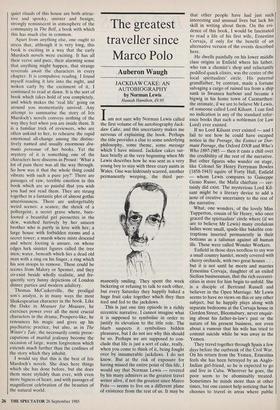The greatest traveller since Marco Polo
Auberon Waugh
JACKDAW CAKE: AN AUTOBIOGRAPHY by Norman Lewis Hamish Hamilton, £9.95 Iam not sure why Norman Lewis called the first volume of his autobiography Jack- daw Cake, and this uncertainty makes me nervous of explaining the book. Perhaps the title provides a clue to some underlying philosophy, some theme, some message which I have missed. Jackdaw cakes sur- face briefly at the very beginning when Mr Lewis describes how he was sent as a very young boy to stay with three crazy aunts in Wales. One was hideously scarred, another permanently weeping, the third per- manently smiling. They spent the week bickering or refusing to talk to each other, but every Saturday they happily baked a huge fruit cake together which they then iced and fed to the jackdaws.
This is just one tiny episode in a richly eccentric narrative. I cannot imagine what it is supposed to symbolise in order to justify its elevation to the title role. The blurb suspects it symbolises hidden pleasures, but I do not see why this should be so. Perhaps we are supposed to con- clude that life is just a sort of cake, really, when you come to think of it, being fought over by innumerable jackdaws. I do not know. But at the risk of exposure for having missed the entire point of this life, I would say that Norman Lewis — revered by his many admirers as the greatest travel writer alive, if not the greatest since Marco Polo — seems to live on a different plane of existence from the rest of us. It may be that other people have had just such interesting and unusual lives but lack his skill in writing about them. On the evi- dence of this book, I would be fascinated to read a life of his first wife, Ernestina Corvaja, if only for the benefit of an alternative version of the events described here.
He dwells painfully on his lower middle class origins in Enfield where his father, who ran a chemist's shop and reluctantly peddled quack elixirs, was the centre of the local spiritualists' circle. His paternal grandfather, by contrast, made a fortune salvaging a cargo of ruined tea from a ship sunk in Swansea harbour and became a bigwig in his home town of Carmarthen: the intimate, if we are to believe Mr Lewis, of someone called Lord Kilsant. I can find no indication in any of the standard refer- ence books that such a nobleman (or Law Lord) ever existed.
If no Lord Kilsant ever existed — and I fail to see how he could have escaped notice in the Peerage, the Extinct or Dor- mant Peerage, the Oxford DNB and Who's Who 1897-1985 — then it casts a chill over the credibility of the rest of the narrative. But other figures who wander on stage, like Colonel Sir Henry Ferryman Bowles (1858-1943) squire of Forty Hall, Enfield — whom Lewis compares to Guiseppe Genio Russo, the Mafia chieftain — cer- tainly did exist. The mysterious Lord Kil- sant might be a literary device to add a note of creative uncertainty to the rest of the narrative.
What, one wonders, of the lovely Miss Tupperton, cousin of Sir Henry, who once graced the spiritualists' circle where (if we are to believe Mr Lewis) many credulous ladies wore small, spade-like bakelite con- traptions inserted permanently in their bottoms as a talisman against all human ills. These were called Wonder Workers.
Enfield in those days needless to say was a small country hamlet, mostly covered with cherry orchards, with two great houses . . but it is not until he meets and marries Ernestina Corvaja, daughter of an exiled Sicilian businessman, that the rich eccentri- cities in store for him begin to unfold. She is a disciple of Bertrand Russell and believer in the Open Marriage. Mr Lewis seems to have no views on this or any other subject, but he happily plays along with separate bedrooms at the Corvaja house in Gordon Street, Bloomsbury, never enquir- ing about his father-in-law's past or the nature of his present business, nor even about a rumour that his wife has tried to commit suicide while he was away in the Yemen.
They travel together through Spain a few days before the outbreak of the Civil War. On his return from the Yemen, Ernestina feels she has been betrayed by an Anglo- Indian girl-friend, so he is expected to go and live in Cuba. Wherever he goes, the poor seem to be abominably treated. Sometimes he minds more than at other times, but one cannot help noticing that he chooses to travel in areas where public torture and execution seem to be the norm. In fact, like a forebear who kept a detailed notebook of all public executions in Wales, he constantly returns to the subject. There is one very funny story about a Professor Dornier, in Algiers, who was conducting experiments in human consciousness. He stood by the guillotine in rubber gloves, seizing each head as soon as it came off and shouting in an ear: 'Eh Jacques! Tu m'entends? Reponde He ends the story: `They say the eyes always opened once, sometimes twice.'
Perhaps it was his upbringing in a spir- itualist's household which makes him find so few things odd or incredible. When war broke out he left Ernestina in Latin Amer- ica where she eventually married a Guate- malan; later, the Guatemalan is forced to divorce her and marry a niece of the local dictator whom he has impregnated: then all three go off to live in Spain — Ernesti- na, the Guatemalan and the dictator's niece — and she disappears from the story. That is a typically neat ending for an episode in Norman Lewis's life.
The war takes him, as a sergeant, with an Intelligence group to Algeria where his mad commanding officer, Captain Merylees, suddenly announces that he wishes to be known as Captain FitzClar- ence. Some time later Captain Merylees- FitzClarence summons his men who find him naked except for a Sam Brown and pistol. He announces he is going to shoot one of them, then himself, and is led away by a medical orderly. Another neat ending.
The Bey of Tunis sends for Sergeant Lewis and explains that he is fed up with the French and wants the sergeant to arrange for Tunisia to become part of the British Empire. Then, of course, Sergeant Lewis is put in charge of conducting 3,000 Russian prisoners from Italy by boat back to the Soviet Union, via the Far East, to be shot.
One would suspect a mild case of what is known to medicine as the Munchausen Syndrome, except that it is obviously all true. Lewis's account of conditions in Naples, where he arrived with the Amer- ican army to reinstate the Mafia which had been all but suppressed by Mussolini since 1923, is already well-known; nobody has ever contradicted it. He does not repeat it here, nor does he repeat his post-war adventures in the Far East and elsewhere which have already appeared in his travel books now reissued by Eland Books: Na- ples '44; A Dragon Apparent; Golden Earth. With this autobiography, Penguin are reissuing several of his novels (includ- ing the excellent Sicilian Specialist) as well as Voices of the Old Sea, his account of life in a Spanish fishing village.
Perhaps his greatest gift, as a traveller, is to involve himself in the life and dramas of the places he visits. I do not know. But I hope this assault from so many directions at once has the effect of drawing attention at long last to one of the best writers and most unusual characters of our day.















































 Previous page
Previous page